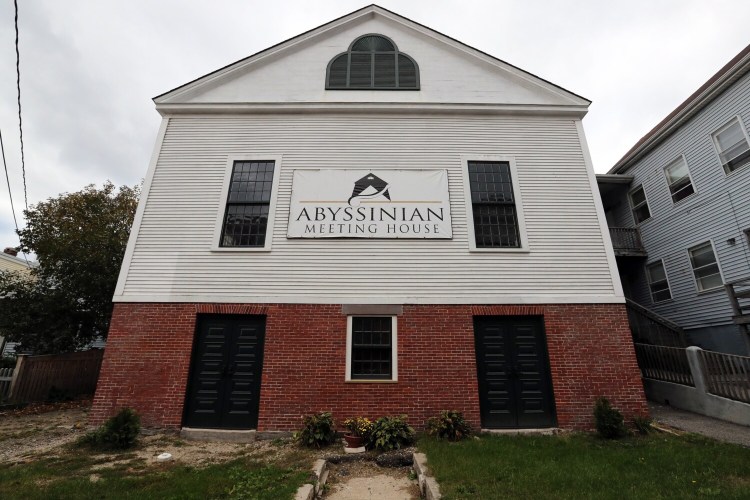Leonard Cummings got the news late Thursday night.
The U.S. Senate had just approved a $1.7 million federal budget appropriation to complete the restoration of the Abyssinian Meeting House, a Portland landmark that is one of the oldest Black churches in the United States.
The funding is part of more than $200 million allocated for 105 Maine projects included in the $1.5 trillion omnibus funding package that’s on its way to be signed by President Biden.
“I’m still jumping in my seat,” Cummings, 87, said Friday morning. “All you can do is praise the Lord and the spirits of yesterday. How can you express 25 years of struggle? All I can say is, ‘Thank you.’ ”
Cummings and his family have led the Committee to Restore the Abyssinian since the city sold the boarded-up, fire-damaged, tax-delinquent building to the restoration group for $250 in 1998.
Through the years, the group struggled to raise just over $1 million to restore the timber frame building from its brick-and-mortar basement to its hand-hewn roof beams. Volunteer members pieced together funding from various sources, including federal agencies, historical foundations and anonymous donors. But as of 2020, they still needed more than $1 million to complete the project as a learning center and community meeting space.
Their efforts got much needed attention and a funding boost following the death of George Floyd and the Black Lives Matter movement that it awakened in Maine. The Abyssinian was included in the 2020 Juneteenth rally and protest march through Portland, and it was featured in a Press Herald story about Cummings and the committee.
“People here responded so beautifully,” Cummings said, noting that donations to the committee since June 2020 have exceeded $400,000.

Leonard Cummings, a founder of the Committee to Restore the Abyssinian, looks out of a window inside of the Abyssinian Meeting House in Portland on Thursday, June 11, 2020. Brianna Soukup/Staff Photographer
With the $1.7 million budget appropriation, he said, “we have enough money now to give the people of this city and this state one fine building.”
Built in 1828, the Abyssinian is the nation’s third-oldest meetinghouse constructed by a Black congregation, after churches in Boston and Nantucket.
Sen. Susan Collins, R-Maine, a senior member of the Senate appropriations committee, helped secure the funding for the Abyssinian.
“The Abyssinian is a cultural landmark that preserves an integral part of our nation’s history, as well as African-American heritage in Maine,” Collins said in a written statement. “I strongly advocated for this investment to help support the ongoing efforts to renovate and restore the Abyssinian so that current and future generations can learn about this historically significant building, as well as the people who worshiped and preached (there).”
Sen. Angus King, an independent, and Rep. Chellie Pingree, D-1st District, also supported the funding.
“The tireless effort to restore the Abyssinian Meeting House shows just how important this building is to Maine’s Black community and what it represents to American history,” King said in a written statement. “This is more than a building, it is a physical reminder of the centuries of contributions Black Mainers have made to the state we all love. I can’t wait to see how these funds are put to work to strengthen the Portland community and our state as a whole.”
Pingree pushed for the funding as a senior member of the House appropriations committee.
“The Abyssinian Meeting House is a vital part of Black history and of Maine’s cultural heritage,” she said in a written statement. “After a 25-year effort to restore the landmark, this critical federal funding will finally bring this nearly two-centuries-old historic site back to life.”
UNDERGROUND RAILROAD HUB
Located in Portland’s historic East End, the Abyssinian is listed on the National Register of Historic Places and recognized as a northern hub of the Underground Railroad and the anti-slavery movement. In 2013, the National Trust for Historic Preservation listed the Abyssinian as one of the most endangered historic places in the United States.
In 1826, six free Black men – Reuben Ruby, Caleb Jonson, Clemant Tomson, Job Wentworth, Christopher Manuel and John Sigs – published a letter in a Portland newspaper announcing their plan to build a church for the Black community. They said they no longer wanted to be relegated to the balconies and back pews of Portland’s white houses of worship.
“Pardon our misapprehensions, if they be such,” the men wrote, “(but) we have sometimes thought our attendance was not desired.”
The Abyssinian thrived through the 1800s as the religious and cultural heart of Portland’s Black community. But church membership took a serious blow in 1898, when the SS Portland was caught in a terrible storm and sank during a return trip from Boston.
At least 194 people died when the steamship went down, including 19 crew members who attended the Abyssinian. Two of them were church trustees. The congregation never recovered, and the church eventually closed. It was sold and converted into a tenement, with an added floor dividing the soaring sanctuary into several low-budget apartments.
Cummings credits city leaders with contributing to the restoration of the Abyssinian through the years, most recently former City Manager Jon Jennings.
With recent donations, the committee last year was able to complete the installation of historically accurate windows and doors that restore the building’s exterior to its appearance in the 1830s, Cummings said.
The $1.7 million in federal funding will allow the committee to complete the interior restoration, install facilities for a learning center and community meeting space, and develop programming for visitors. Committee leaders are expected to draw up a timeline for finishing the project in the coming weeks.
“We’ve worked hard for this,” Cummings said. “This building will present Black history and Black struggle that was lost in time and was never told.”
Send questions/comments to the editors.



Comments are no longer available on this story